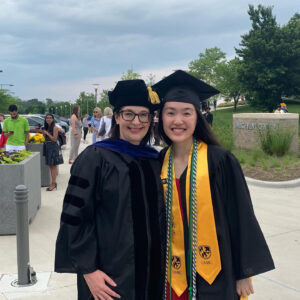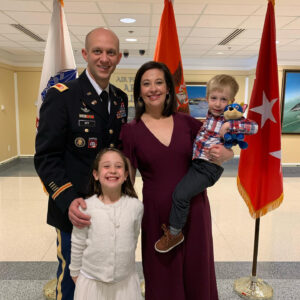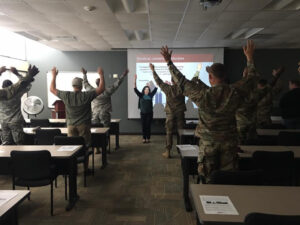
Meet Laura, a teaching assistant professor in the Department of Biology at the University of North Carolina at Chapel Hill. Originally from St. Johns, Michigan, Laura and her family now call North Carolina home. Laura has crafted a career in STEM education, obtaining her B.S. in Microbiology from Michigan State University and a Ph.D. in Immunology from North Carolina State University. From the lab bench to the lecture hall, Laura is passionate about helping her students and fellow military spouses succeed in a diverse range of STEM careers.
“Being a military spouse has helped me better understand and support a growing population of students in my classroom. I’m a huge advocate for military-connected students and want to support them in any way I can.”
What inspires you?
I’m inspired by my students. While my job is to help them learn important concepts and/or develop competencies to excel in the field of science (or become scientifically literate members of society), they inspire me by their resilience, their hard work, their drive, and the truly awesome things that they go on to do. My former students are doing all sorts of things; healthcare providers, life science researchers, educators, engineers, lawyers, entrepreneurs, etc. Regardless of their career path, they are positively impacting the world around them and I’m so glad that I get to be a small part of their academic and/or professional journey.
Tell us an interesting story about growing up that is related to your field of work.
I am the daughter of a veterinarian and spent a lot of time as a kid going on farm calls with my dad. This fostered my love of biology, as I got to see applications firsthand from a really young age! Plus, it was fun to play with my dad’s patients.
What are some of your interests outside of the office?
Cooking, fashion, travel, sports, and spending time with my family.
What is your current duty station?
Fort Bragg, NC.
What do you enjoy about your current duty station?
This is home for us—it is where my husband and I met, where we got married and had our first child, and where I did my graduate training. We love living in the Carolinas!

How does your day start or what gets you out of bed in the morning?
My schedule varies day-to-day, but I often start my morning responding to emails and getting organized for the day (after, of course, I get my two kiddos off to school). I teach three courses per semester and can have hundreds of students at a time, so staying organized is so important!
What’s the coolest thing you’re working on right now?
Besides teaching some really fun (and interesting) biology courses, I’m helping with a curriculum redesign project. While I’m trained as a bench scientist, my research interests over the past 8 years or so has been on interventions that can promote the success of diverse students in STEM. A well-designed, active, and engaging curriculum, with built-in structure and assessment strategies, is such an important aspect of ensuring the success of diverse students.
What do you appreciate about your work environment?
First, I really appreciate the support I’ve received from my colleagues. I’m relatively new in my current role (I started in July 2020) and am very fortunate to have colleagues who have shared materials, answered endless questions, and helped me brainstorm different approaches. The second thing that I appreciate is the flexibility I have. While I obviously have class and other events that are “fixed”, as a military spouse and mom, it is nice to know that I can work my schedule in a way that I can also support my service member (and attend the occasional Army function) and be actively involved in my kids’ education and activities.
What is your biggest achievement to date – professionally?
Besides landing my current position (which is the type of faculty position I’ve wanted for many years), my biggest achievement was being part of teams that were successfully awarded large sums of money from two separate federal agencies to investigate strategies to support student success in STEM.
I’m also really proud of some work that I did previously exploring the educational and career goals of military spouses. I teamed up with education and psychology researchers at one of my previous institutions and developed a survey to better understand the impact of the military lifestyle on the educational and career goals of military spouses. Simply put, military spouses are driven and resilient professionals, and I hope that this work can further inform ways that we can support the educational and professional goals of our nation’s military spouses. You can read a paper that we published on this study HERE.
I’m also proud that I got a room full of transitioning service members interested in a career in the biotechnology field to do a little song and dance about antibody structure. I perform the “Antibody Dance” each semester for my students (it works!) and it was awesome how the service members got into it. I love creating these types of fun learning environments!

What do you like most about your job?
I get to interact with people and help others achieve their goals. My students really make my job great and I am thankful that I get to be a small part of their academic and professional success. There is nothing better than seeing one of your students succeed!
What challenges have you personally faced that your civilian counterparts may not have?
Like most military spouses, we have PCS’d frequently (for example, we moved three times in the past five years). While this has certainly been stressful, I’ve been very fortunate that through all of our moves, I’ve been in a position that was in alignment with my long-term professional goals. Our moves have required me to take “non-traditional” positions, but I’m honestly thankful for these opportunities, as they helped me build my skill set for the better (and made me more competitive for my current position).
Do you find you’re more adaptable to change than your civilian counterparts?
Not necessarily. Regardless if you are a civilian or military spouse, you will always have stressors in your life that will require you to adapt to different situations. While the situations for military life may be unique (deployments and frequent relocations), I don’t think it makes me more or less adaptable to change than a non-military affiliated individual. We are all honestly doing our best—my stressors may just look a little different than others.
What do you wish people knew about life in the military?
The military is a very diverse community and that is such a wonderful asset. We have military friends from all backgrounds, and it is wonderful to see this community come together for a common mission.
How do you feel like Professional Organizations like SMSS can help you with your career or professional goals?
I think the best way for professional organizations to help military spouses is to establish a structured mentoring program. I’ve had to navigate my own path as a military spouse and faculty member, as I don’t personally know other military spouses with a similar career. While I’ve been successful and have had numerous non-military affiliated mentors who have supported me, I’ve certainly had some unique military-specific challenges (or had people doubt that I could be both a military spouse supporting my service member and a faculty member). I think building a community of military spouses who can support and mentor each other throughout their careers would be such a valuable asset. If any military spouse is considering a career as a faculty member (or thinking about pursuing a career in the biomedical/life sciences research field), I hope they will reach out to me for support.
What advice would you give to new spouses about being in the STEM career field?
1) Be flexible—a job may not seem like a perfect fit initially, but it may end up being a great opportunity to build your skill set and get you to the next level (or your dream job).
2) Find mentors to support you both professionally and personally. A military spouse can absolutely have a career in STEM and having mentors to help you navigate your career in the context of your military lifestyle is so important. And notice that mentors are plural. Find many mentors—the more the better!
3) If you are ever in a position where you can’t find employment in your chosen field, find the closest university, research laboratory, etc. nearby and try to expand your skill sets. While you can certainly take a class or pursue another degree (and there are numerous military spouse scholarships available), you could also expand your skillsets by volunteering in a research lab or working on a special project. Network with other scientists in your community because you never know where it could lead!
Resources & Connections for STEM Education
- If you’re looking for resources or opportunities within the higher education field:
- If you’re looking for resources or opportunities within the life sciences field:
- STEM education resources specific for military spouses:

Congratulations to Laura. St. Johns High School students and staff have always been proud of her. A well rounded woman she also was very active at SJHS as a swimmer and band member. We are so proud of her and her accomplishments — what a great example of “blooming where you are planted — or transplanted. Such a wonderful role model for future female scientists.